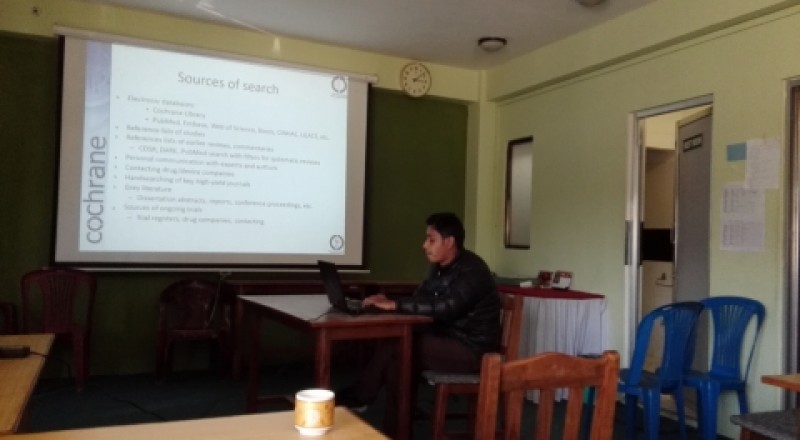A session on database search and referencing was organized at HERD on February 17, 2016. The session was facilitated by Dr Nipun Shrestha, Research Officer at HERD.
The interactive session was on searching articles through online database and referencing focusing on how to search database properly, find the full text of articles using HINARI and use referencing software like Microsoft Endnote. The objective of the session was to help the researchers learn about the efficient ways of searching data in public database portal.
The session started with an introductory exercise following discussions on various aspects database search and referencing. Shrestha gave some important practical tips and informed how to look for data in PubMED and HINARI. Basic principles in terms of Do’s and Don’ts were also shared.
He informed on how to search for data and how to link up the words. The problem with word search was highlighted and solutions were suggested. Some exercises were also done which helped the participant gain a proper understanding about the topic. Shrestha also briefed about how to use End Note to look for articles.
A small session on systematic review (introduction, types and how it is done) was also held. “It’s a new dimension of research and many of us are unaware what is it actually and why is it done", informed Shrestha. During the session, he also explained how systematic review is different from literature review. Furthermore, he gave tips on how to define search strategy was pointed. Topics like meta-analysis and systematic review in qualitative research were also discussed. He emphasized on the importance of conducting systematic reviews in terms of designing major programmes/interventions as systematic reviews would be carried in an objective and rigorous manner and the findings of a systematic review could be equivalent to a long term Randomized Control Trial (RCT) study.
Facilitator’s Opinion

Dr Nipun Shrestha, Research Officer
We all have been involved in research for quite a long time. However, still many of us are unaware how to search database properly, find the full text of articles and use referencing software like Endnote. The session was organized on these small topics which in fact would be quite helpful in our day to day work. I found that all the participants were quite interested and enthusiastic to learn.
Participant’s views

Bhagiman Lingden, Field Monitoring Officer
The session was very fruitful in terms of getting basic information on the use of a public database portal HINARI for literature search, fundamentals of systemic review and use of ‘endnote’ for annotation in academic works. It would be highly appreciable if such capacity building trainings/workshops are held in the days to come on a regular basis in or outside the premises of this organization.

Sharmila Gautam, Data Management Clerk
The session was fruitful and helped us gain more knowledge on how to search literature from legal source like, PubMED, HINARI and EndNote. The small session on systematic review and literature review was also helpful. The session did help us learn new things and broaden existing knowledge. We further learned about the ways of citation.
HINARI Programme set up by WHO provides free or very low cost online access to the major journals in biomedical and related social sciences to local, not-for-profit institutions in developing countries.
EndNote is a commercial reference management software package which is used to manage bibliographies and references while writing essays and articles.
PubMed is a service of the US National Library of Medicine which provides free access to MEDLINE, the NLM database of indexed citations and abstracts to medical, nursing, dental, veterinary, health care, and preclinical sciences journal articles.



Comments(0)
No comments found.